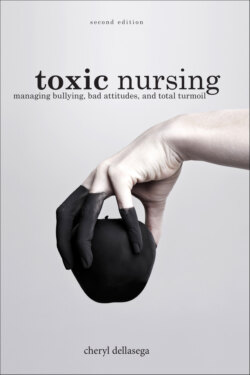Читать книгу Toxic Nursing, 2nd Ed - Cheryl Dellasega - Страница 58
На сайте Литреса книга снята с продажи.
summary
ОглавлениеGossip is a fundamental part of human behavior. We gossip at home and at work, often with different intents. It’s not always bad: sometimes we gossip because we’re excited to share some good news or say a kind word about someone else. Often, though, we gossip with malicious intent. We say things that are untrue, exaggerated or unkind.
Gossip and negative “trash talk” can take on a life of their own, poisoning a unit and spilling into other venues such as home and leisure activities. Often, the consequences of gossip aren’t clearly understood, nor are the ways to address it, but limiting the fallout of negative talk is imperative.
Given that it’s unlikely we can change human behavior, we need to establish strategies for 1) reducing negative gossip and 2) dealing with it when it happens. Education is always a good place to start. Education that takes the form of an open conversation can give nurses the message that their voice is important and being heard.
Recently, a colleague shared the example of a new nurse leader who called all of her employees together for an in-person meeting. “I have no tolerance for gossip or negative talk, which I’ve been told is part of this unit’s tradition. From here on, please come to me with any instances of incivility and bullying behaviors.” This simple intervention reset the culture of her workplace.
The most critical strategy is that nurse managers must manifest the professional behaviors they want to see in those they work with. As a role model who provides an example of desired behavior, monitor your own interactions and make sure you aren’t inadvertently passing along bits of information that may or may not be true. Challenge your staff to adopt a “zero tolerance” policy for gossip—start with one shift, then see if you can increase to one day, one week, one month, and so on. Once the cycle of negative interactions is changed, the work environment will be more enjoyable for everyone involved. Use the activities that follow to further work on decreasing gossip and other caustic conversation.
Fostering Cultural Change
Read the following passage:
Sharon told Millie that Carrie, a coworker, seemed withdrawn lately and was seeing a psychiatrist. In turn, Millie expressed concern about Carrie’s well-being to four other coworkers they both knew, and they shared the information with four more. Before long, Carrie’s “depression” was common knowledge in the small organization where she worked—except that Carrie wasn’t depressed. She was dating a psychiatrist, which is why she was seen entering his office during her day off.
Ask staff (or yourself) to use the “Gossip Filter” test to answer these four questions:
1. Did Millie receive the information shared firsthand?
2. Did Millie know for a fact that the information was true?
3. What was Millie’s motivation for sharing the information?
4. Would Millie have shared the same information if Carrie was present?
Next, ask everyone to think about a recent incident where some spicy information or potential gossip came their way, and use the four questions above to evaluate the situation and whether the information was shared or not. Encourage use of the “Gossip Filter” in the future.
Alternatively, discuss how you can hold yourself accountable to reducing gossip and brainstorm strategies for holding yourself and others accountable. Create a poster or other reminder that caring doesn’t always mean sharing information that could be harmful to another.
